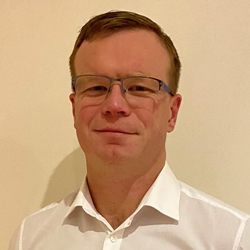
Shane Doyle
Senior Vice President and Head of Operations, Alexion

Michael Teehan
Vice President and Head of Integrated Manufacturing, Alexion
Climate change is no longer just knocking at our front door. It’s literally knocking it down. Industry needs to ensure that sustainability is a key priority area for business.
In early November, 197 nations came together for the United Nations COP26 climate change conference in Glasgow, Scotland to discuss how to accelerate current efforts to mitigate the impact of climate change across the planet. After some last-minute compromises on coal, a revised agreement was reached, which is the most ambitious climate pact since Paris 2015. The deal aims to cap global warming at 1.5 degrees Celsius above pre-industrial levels.
The COP26 agreement effectively acknowledged that commitments made so far to cut emissions of planet-heating greenhouse gases were nowhere near enough and asked nations to set stronger climate pledges next year, rather than every five years, as they are currently required to do.
Companies—large and small—will also need to take steps to ramp up their sustainability efforts to help reduce negative environmental impacts.
Building a more sustainable business
At Alexion, sustainability is at the forefront of everything we do, not least manufacturing, to minimise negative environmental impacts while conserving energy and natural resources.
“We all need to be good stewards of our environment and planet,” says Shane Doyle, Senior Vice President and Head of Operations at Alexion. “As a pharmaceutical company, we have an obligation to our patients, employees and communities to develop innovative medicines and solutions in the most responsible way.”
In late July, Alexion Pharmaceuticals joined AstraZeneca creating Alexion, AstraZeneca Rare Disease, which is the group within AstraZeneca focused on rare diseases. As a leader in rare diseases for nearly 30 years, Alexion’s mission is to transform the lives of people affected by rare diseases and devastating conditions through the development and delivery of innovative medicines, as well as through supportive technologies and healthcare services.
As a pharmaceutical company, we have an obligation to our patients, employees and communities to develop innovative medicines and solutions in the most responsible way
Shane Doyle
Building toward a sustainable future
“We have done a lot of great work around sustainability and our carbon footprint. Alexion’s recent integration with AstraZeneca will really allow us to take this work to the next level enabling us to achieve our sustainability ambitions,” says Michael Teehan, Vice President and Head of Integrated Manufacturing for Alexion.
In 2020, AstraZeneca launched Ambition Zero Carbon, committing to become zero carbon by 2025 across operations (sites and fleet) without carbon credits and carbon negative in its value chain by 2030. These greenhouse gas targets exceed the science based targets initiative reductions required to keep warming to 1.5 degrees Celsius, the most ambitious goal of the Paris Agreement, which was signed at the 2015 COP meeting.
During COP26, AstraZeneca, along with nine other global pharmaceutical companies launched Project Energize, a cross-industry renewable energy project. The programme is a first-of-its-kind initiative to drive increased use of renewable energy across the pharmaceutical supply chain. It will support suppliers in switching to renewables, significantly impacting their carbon footprint and our 2030 carbon negative target. It also sends a powerful message of collaboration and momentum towards more sustainable healthcare.
During the next three years, Alexion will move at an even faster pace in sustainability and has joined Project Energize with AstraZeneca in pursuing a science-based sustainability strategy, Teehan says.
“We all have an obligation to the world we live in to give it the best chance for the long term,” he adds. “The less we rely on fossil fuels now, the better off we will be in the future.”


